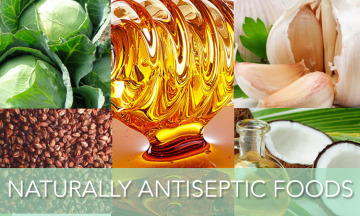Nutrition
Why Do We Need Naturally Antiseptic Foods?
Discover the Top Naturally Antiseptic Foods
Did you know that the literal meaning of the word antibiotics is “against life?” Well, not of human life, but of the microorganisms that cause infections and diseases. Discovered in the 1920s, antibiotics have become some of the world’s most useful pharmaceutical drugs, curing a wide array of health problems.
However, there has been a growing concern over the phenomenon referred to by experts as “antibiotic resistance.” According to the Alliance for the Prudent Use of Antibiotics (APUA), some types of bacteria and microorganisms have become resistant to antibiotics because of overuse. In fact, there are now some serious ailments that have become more difficult to treat.
Therefore, medical experts recommend using antibiotics only when necessary. According to the Journal of the American Medical Association, doctors have reduced the number of antibiotic prescriptions since the 1990s. Apart from that, it would also be best to make use of naturally antibacterial foods that can help treat ailments without causing antibiotic resistance.
Also known as “astringent foods,” these are known to cleanse the blood and fight bacteria without turning bugs into “superbugs.” Here are some of them:
Garlic
Garlic contains a potent compound called allicin, which is released when garlic is chewed or crushed. Allicin has properties similar to that of penicillin. It is therefore antibacterial, anti-fungal and anti-parasitic. Not only that, it is also an antioxidant that suppresses the damaging effects of free radicals on the body.
Since the ancient times, garlic has been used to treat colds, inflammation and some other serious infections. And because it’s packed with vitamins and minerals, you’ll also be doing your health a favor including this wonder-spice in your daily diet.
Honey
Ancient Romans were among the first to use honey in treating wounds and infection during war times. Over time, honey became a popular remedy for many types of ailments, as it is one of the world’s best natural antibacterial, anti-inflammatory, antiseptic and anti-microbial foods.
Honey has an enzyme that is said to produce hydrogen peroxide, which in turn aids the body in fighting against infection. It also inhibits the growth of bacteria. Used internally, honey can ward off health issues like cough, sore throat, common cold, and allergies.
On top of all these, topical application of honey can help in the treatment of skin infections like acne, eczema and psoriasis. It’s no wonder the golden liquid has become famous all over the world for its array of amazing skin benefits.
Cabbage
Members of the cruciferous family, along with kale and broccoli, cabbage is rich in sulfur compounds that have been found to be effective in fighting against certain forms of cancer. Aside from this, cabbage is also packed with vitamin C, which boosts the immune system.
In fact, just a cup supplies 75 percent of the daily recommended amount of this vitamin. This naturally antibacterial vegetable can be eaten raw or in the form of juice. Adding honey to sweeten your cabbage juice is a good way to maximize its disease-fighting powers.
Grapefruit Seed Extract (GSE)
According to the Journal of Alternative and Complementary Medicine, grapefruit seed extract can effectively combat up to 800 types of bacteria and viruses. It can also offer maximum protection against hundreds of parasites and strains of fungus. It does so by maintaining good bacteria in the gut, alkalizing the body, and boosting the body’s immune resistance.
Virgin Coconut Oil
Virgin coconut oil (untouched, pure coconut oil) has long been touted for its anti-microbial and anti-fungal properties. And, because it’s overloaded with antioxidants, it can ward off the negative effects of free radicals inside the body.
Adding a spoonful virgin oil in your coffee each day can help in lowering cholesterol, maintaining proper levels of blood sugar, improving brain function, and balancing thyroid. And of course, the virgin oil’s antibacterial powers can help keep minor and serious ailments at bay.
With so many food with antiseptic properties there’s no need to rely on antibiotics all the time. Not only could this be counterproductive, it can also take a toll on your financial health. Make use of naturally antiseptic foods, which are not only effective in protecting you against diseases but are also easier on the pockets.

